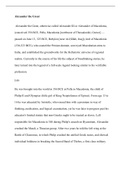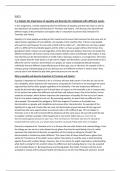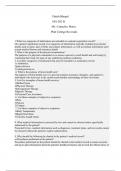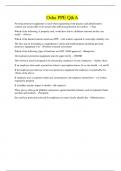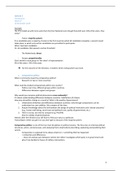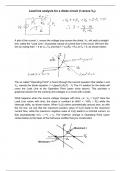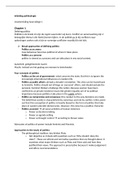Alexander the Great
Alexander the Great, otherwise called Alexander III or Alexander of Macedonia,
(conceived 356 BCE, Pella, Macedonia [northwest of Thessaloníki, Greece] —
passed on June 13, 323 BCE, Babylon [near Al-Ḥillah, Iraq]), lord of Macedonia
(336-323 BCE), who ousted the Persian domain, conveyed Macedonian arms to
India, and established the groundworks for the Hellenistic universe of regional
realms. Currently in the course of his life the subject of breathtaking stories, he
later turned into the legend of a full-scale legend looking similar to his verifiable
profession.
Life
He was brought into the world in 356 BCE at Pella in Macedonia, the child of
Philip II and Olympias (little girl of King Neoptolemus of Epirus). From age 13 to
16 he was educated by Aristotle, who roused him with a premium in way of
thinking, medication, and logical examination, yet he was later to progress past his
educator's limited statute that non-Greeks ought to be treated as slaves. Left
responsible for Macedonia in 340 during Philip's assault on Byzantium, Alexander
crushed the Maedi, a Thracian group. After two years he told the left wing at the
Battle of Chaeronea, in which Philip crushed the unified Greek states, and showed
individual boldness in breaking the Sacred Band of Thebes, a first class military
,corps made out of 150 sets of sweethearts. After a year Philip separated from
Olympias, and, after a squabble at a blowout held to commend his dad's new
marriage, Alexander and his mom escaped to Epirus, and Alexander later went to
Illyria. In practically no time a while later, father and child were accommodated
and Alexander returned, however his situation as main successor was imperiled.
In 336, notwithstanding, on Philip's death, Alexander, acclaimed by the military,
prevailed without resistance. He on the double executed the rulers of Lyncestis,
asserted to be behind Philip's homicide, alongside all potential adversaries and the
entire of the group went against to him. He then walked south, recuperated a
faltering Thessaly, and at a gathering of the Greek League of Corinth was
designated generalissimo for the impending intrusion of Asia, currently arranged
and started by Philip. Getting back to Macedonia via Delphi (where the Pythian
priestess acclaimed him "powerful"), he progressed into Thrace in spring 335 and,
subsequent to constraining the Shipka Pass and pounding the Triballi, crossed the
Danube to scatter the Getae; turning west, he then crushed and broke an alliance of
Illyrians who had attacked Macedonia. In the mean time, gossip of his demise had
encouraged a revolt of Theban leftists; other Greek states leaned toward Thebes,
and the Athenians, asked on by Demosthenes, casted a ballot help. In 14 days
Alexander walked 240 miles from Pelion (close to current Korçë, Albania) in
Illyria to Thebes. At the point when the Thebans would not give up, he made a
, passage and demolished their city to the ground, saving just sanctuaries and
Pindar's home; 6,000 were killed and all survivors sold into bondage. The other
Greek states were cowed by this seriousness, and Alexander could bear to
permissively treat Athens. Macedonian posts were left in Corinth, Chalcis, and the
Cadmea (the stronghold of Thebes).
Starting points of the Persian undertaking
From his promotion Alexander had focused on the Persian undertaking. He had
grown up to the thought. Additionally, he really wanted the abundance of Persia if
he somehow happened to keep up with the military worked by Philip and pay off
the 500 abilities he owed. The adventures of the Ten Thousand, Greek warriors of
fortune, and of Agesilaus of Sparta, in effectively battling an in Persian area had
uncovered the weakness of the Persian domain. With a decent cavalry force
Alexander could hope to overcome any Persian armed force. In spring 334 he
crossed the Dardanelles, leaving Antipater, who had currently dependably served
his dad, as his delegate in Europe with north of 13,000 men; he, at the end of the
day, directed around 30,000 foot and more than 5,000 rangers, of whom almost
14,000 were Macedonians and around 7,000 partners sent by the Greek League.
This military was to demonstrate noteworthy for its reasonable mix of arms. Much
work fell on the lightarmed Cretan and Macedonian toxophilite, Thracians, and the
Agrianian spear men. In any case, in pitched fight the striking power was the
Alexander the Great, otherwise called Alexander III or Alexander of Macedonia,
(conceived 356 BCE, Pella, Macedonia [northwest of Thessaloníki, Greece] —
passed on June 13, 323 BCE, Babylon [near Al-Ḥillah, Iraq]), lord of Macedonia
(336-323 BCE), who ousted the Persian domain, conveyed Macedonian arms to
India, and established the groundworks for the Hellenistic universe of regional
realms. Currently in the course of his life the subject of breathtaking stories, he
later turned into the legend of a full-scale legend looking similar to his verifiable
profession.
Life
He was brought into the world in 356 BCE at Pella in Macedonia, the child of
Philip II and Olympias (little girl of King Neoptolemus of Epirus). From age 13 to
16 he was educated by Aristotle, who roused him with a premium in way of
thinking, medication, and logical examination, yet he was later to progress past his
educator's limited statute that non-Greeks ought to be treated as slaves. Left
responsible for Macedonia in 340 during Philip's assault on Byzantium, Alexander
crushed the Maedi, a Thracian group. After two years he told the left wing at the
Battle of Chaeronea, in which Philip crushed the unified Greek states, and showed
individual boldness in breaking the Sacred Band of Thebes, a first class military
,corps made out of 150 sets of sweethearts. After a year Philip separated from
Olympias, and, after a squabble at a blowout held to commend his dad's new
marriage, Alexander and his mom escaped to Epirus, and Alexander later went to
Illyria. In practically no time a while later, father and child were accommodated
and Alexander returned, however his situation as main successor was imperiled.
In 336, notwithstanding, on Philip's death, Alexander, acclaimed by the military,
prevailed without resistance. He on the double executed the rulers of Lyncestis,
asserted to be behind Philip's homicide, alongside all potential adversaries and the
entire of the group went against to him. He then walked south, recuperated a
faltering Thessaly, and at a gathering of the Greek League of Corinth was
designated generalissimo for the impending intrusion of Asia, currently arranged
and started by Philip. Getting back to Macedonia via Delphi (where the Pythian
priestess acclaimed him "powerful"), he progressed into Thrace in spring 335 and,
subsequent to constraining the Shipka Pass and pounding the Triballi, crossed the
Danube to scatter the Getae; turning west, he then crushed and broke an alliance of
Illyrians who had attacked Macedonia. In the mean time, gossip of his demise had
encouraged a revolt of Theban leftists; other Greek states leaned toward Thebes,
and the Athenians, asked on by Demosthenes, casted a ballot help. In 14 days
Alexander walked 240 miles from Pelion (close to current Korçë, Albania) in
Illyria to Thebes. At the point when the Thebans would not give up, he made a
, passage and demolished their city to the ground, saving just sanctuaries and
Pindar's home; 6,000 were killed and all survivors sold into bondage. The other
Greek states were cowed by this seriousness, and Alexander could bear to
permissively treat Athens. Macedonian posts were left in Corinth, Chalcis, and the
Cadmea (the stronghold of Thebes).
Starting points of the Persian undertaking
From his promotion Alexander had focused on the Persian undertaking. He had
grown up to the thought. Additionally, he really wanted the abundance of Persia if
he somehow happened to keep up with the military worked by Philip and pay off
the 500 abilities he owed. The adventures of the Ten Thousand, Greek warriors of
fortune, and of Agesilaus of Sparta, in effectively battling an in Persian area had
uncovered the weakness of the Persian domain. With a decent cavalry force
Alexander could hope to overcome any Persian armed force. In spring 334 he
crossed the Dardanelles, leaving Antipater, who had currently dependably served
his dad, as his delegate in Europe with north of 13,000 men; he, at the end of the
day, directed around 30,000 foot and more than 5,000 rangers, of whom almost
14,000 were Macedonians and around 7,000 partners sent by the Greek League.
This military was to demonstrate noteworthy for its reasonable mix of arms. Much
work fell on the lightarmed Cretan and Macedonian toxophilite, Thracians, and the
Agrianian spear men. In any case, in pitched fight the striking power was the

